Nominate Yourself!
We want to tell YOUR story! Fill out our quick nomination form for your chance to be featured.
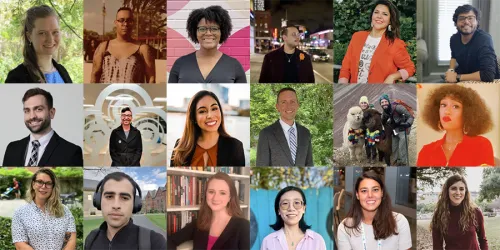
Graduate students at The University of Texas at Austin are changing the world. They're transforming health care through research and technology, working to find energy solutions and helping to deepen our sense of history and culture.
Read what our graduate students are doing, and follow us on social media to see even more features. What will you do as a graduate student?
Graduate Student Profiles
Antonia Vazquez (she/her)
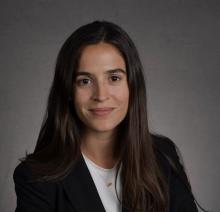
Public Policy | LBJ School of Public Affairs
“Growing up in Argentina, I witnessed firsthand how policy decisions, often made without sufficient evidence, can shape people’s lives,” said Antonia Vazquez, fifth-year Ph.D. candidate in public policy at the LBJ School of Public Affairs. “The LBJ School offered what I was looking for: rigorous training in empirical methods combined with opportunities to work on pressing policy issues, especially those affecting Latin America and underserved communities.”
Vazquez’s research focuses on understanding the effect of public policies and environmental factors on mental health and well-being. In one project, co-authored with Yumin Hong, a Ph.D. student in the Department of Economics, she found that hotter temperatures in Mexico are linked to a rise in emergency room visits for mental health issues. In another set of studies, she's studying low-cost mental health interventions using mobile apps.
Cheng Chow (he/him)
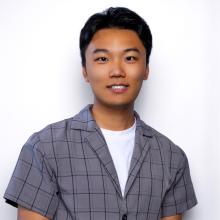
Immigration, Health Equity and Social Policy | Steve Hicks School of Social Work
“My experience as a first-generation immigrant motivates me to serve marginalized communities with social work policy and practice,” Cheng Chow, first-year Ph.D. student in the Steve Hicks School of Social Work said. “UT Austin has provided me with an incredible platform to pursue research that is both personally meaningful and impactful for underserved communities.”
Chow’s research examines how immigration policies, healthcare access and social structures impact the well-being of immigrant communities. By understanding these dynamics, Chow hopes we can better design policies that promote equity and improve health outcomes for all populations. His work has been supported by a Graduate School Recruitment Fellowship.
Lea El Khoury (she/her)
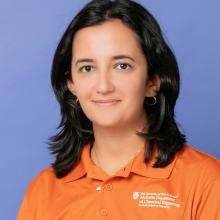
Chemical Engineering | Cockrell School of Engineering
When San Diego residents were concerned about sewage-related air contamination from a nearby river, Lea El Khoury, Ph.D. candidate in the McKetta Department of Chemical Engineering, stepped in to investigate. Her data played a role in prompting local authorities to act on improving air conditions in San Diego.
“My work helps to highlight areas where air pollution is a serious concern,” El Khoury said. “It provides scientific evidence to support better environmental policies that promote cleaner air and healthier communities.”
El Khoury chose UT for its access to world-class research facilities. Support from her advisor, Dr. Lea Hildebrandt Ruiz, and faculty has allowed El Khoury to work on high-impact projects. She is currently investigating the effects of oil and gas operations on air quality in Texas.
Aldo Galli (he/him)
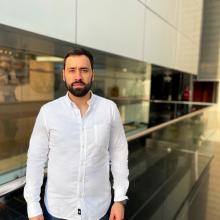
Business Administration | McCombs School of Business
For McCombs MBA student Aldo Galli, it’s all about using the right tools at the right time. In 2023, Galli was selected as one of MIT’s Innovators Under 35 Latin America for his startup, Cocarbon. Cocarbon sustainably produces activated carbon from agricultural waste to enhance water quality in cities and remote areas.
Galli’s work proves that sustainable solutions can be cost-effective, efficient and scalable, even built in spaces with much less resources or efficient institutions than in the US. The supportive environment at UT-Austin, combined with its local resources and circular economics, lays the perfect groundwork for scaling such an urgent project.
“UT provided the perfect environment to deepen my expertise in cleantech,” Galli said. “Austin’s thriving technology hub, outstanding quality of life and proximity to my family in Texas made it the ideal place to grow both professionally and personally.”
Rebecka K. Hahnel-Peeters (she/her)

Psychology | College of Liberal Arts
Psychology Ph.D. candidate Rebecka K. Hahnel-Peeters defends her dissertation this summer, after which she begins an assistant professorship at Indiana State University. In February, she accompanied three undergraduates to the annual convention of the Society for Personality and Social Psychology. One of Hahnel-Peeters' many research interests is the types of defense women use against sexual violence.
“My current work examines which social allies women rely on across different contexts and perpetrator relationships,” Hahnel-Peeters said. “I found that female UT students are much more likely to rely on friends for protection against sexual violence. This may not be the case at a non-residential university or across other cultures.”
Justin Yirka (he/him)
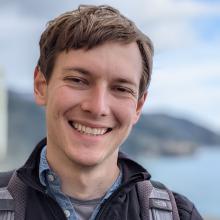
Computer Science | College of Natural Sciences
One important problem in physics involves understanding the energy levels of a system of interacting particles. It is incredibly difficult, even for a quantum computer, so Justin Yirka, sixth-year Ph.D. candidate in computer science, studies approximations.
“One of my recent projects, with a group at Sandia National Laboratories, was to characterize how difficult some of these approximations are,” Yirka said. “By stating these problems and approximations as formal mathematical objects, and then relating them to a fun mixture of geometry and graph problems, we proved new NP-hardness results.”
Erin Crownover (she/her)
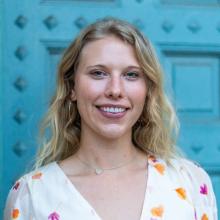
Physical Culture and Sport Studies | College of Education
A former collegiate athlete, Erin Crownover brings her A-game to uncovering the history of the athletic training profession and its origins at UT-Austin. A fourth-year Ph.D. candidate in physical culture and sport studies in the College of Education, Crownover focuses on three key figures in the history of athletic training at Texas: Henry “Doc” Reeves, Frank Medina and Christina Bonci.
“The field of athletic training has long been an outlier in sports medicine, striving for representation due to the lack of doctor status among practitioners,” Crownover said. “The stories of Reeves, Medina and Bonci provide a window into the history of the broader impact of the profession’s development in the 20th century.”
Anjali Singh (she/her)
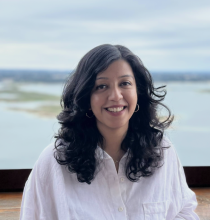
Human-Computer Interaction and Learning Sciences | School of Information
“I have always been fascinated by what makes learning truly meaningful,” said Anjali Singh, Bullard Postdoctoral Fellow at the School of Information. “Deep and effective learning requires effort—making mistakes, learning from them and practicing regularly.”
Singh studies how to help students think more critically about the information generated by Generative AI (GenAI) tools. She recently conducted a study exploring how students use GenAI tools when presented with cues that encourage them to pause and reflect. She is now developing an AI tool that provides personalized cues to guide learners in becoming more thoughtful and intentional in their search process.
Carlos Morales-Aguilar (he/him)
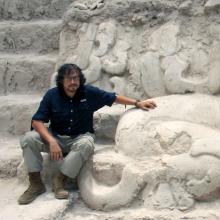
Geography and the Environment | College of Liberal Arts
“The thought of stepping into the unknown, peeling back layers of history, exploring, and revealing ancient buildings that have been hidden beneath the forest canopy for centuries has always sparked my imagination.”
Carlos Morales-Aguilar, postdoctoral fellow in the Department of Geography and the Environment, uses cutting-edge technology to turn imagination into reality. As part of the UT LLAMA Lab, he uses LiDAR technology to generate 3D maps that reveal the landscapes of ancient civilizations. This allows the Lab to pinpoint areas of interest before they travel on-site to excavate.
“UT provided the perfect environment for this work,” Morales-Aguilar said. “Offering a dynamic, interdisciplinary setting where I could connect geography, archaeology and environmental science with state-of-the-art technology.”
Celesté Flores (she/her)
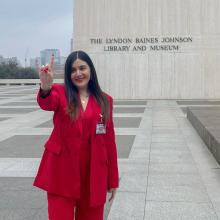
Global Policy Studies and Public Health | LBJ School of Public Affairs
Celesté Flores didn’t waste a single moment at UT! She graduates this May with a dual master’s degree in global policy studies and public health.
“UT is the policy and research hub of Texas,” Flores said. “And for me, there was no better place to build the knowledge and connections I need to make an impact.”
As part of her Texas Global internship, Flores studied greenhouse gas emissions produced from domestic waste management in Tamaulipas, Mexico. Flores built a database tracking emissions from 2000 to 2050. It models the evolution of emissions over time and identifies contributors to the problem.
John Michael Clark (he/him)
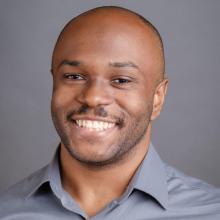
Mathematics | College of Natural Sciences
Fourth-year Ph.D. student John Michael Clark recently attended the Arizona Winter School in Tucson for the second time, where advanced graduate students work with senior faculty and postdoctoral fellows on research projects related to number theory. Last spring, Clark was invited to join a project group at AWS related to his work in arithmetic dynamics. He recently submitted a paper based on the breakthroughs achieved at the conference.
“I’ve always had a knack for mathematics and couldn’t see myself doing anything else,” Clark said. “Even though the work has been tough, I am glad that I am here.”
Anna Bokun (she/her)
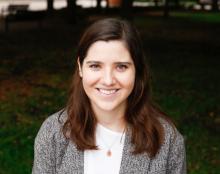
Caregiving, Fertility, and Aging | Population Research Center
Sociology and demography enable us to understand the hidden structures shaping our communities. Dr. Anna Bokun is a postdoctoral researcher at UT's Population Research Center, where she bridges data with theory to examine major life transitions—caregiving, fertility, and aging—to understand how families navigate financial and emotional challenges.
“Across all my work, I’m asking: How do families adapt to life’s biggest challenges?” Dr. Bokun said. “What policies help, or fail them? By studying these questions, I hope to inform solutions that support families' economic wellbeing across the life course. For example, many family caregivers face significant financial burdens, yet social policies often fail to recognize or support them adequately."
Bartik Pandel (he/him)
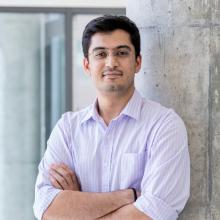
Civil Engineering | Cockrell School of Engineering
Feel like your research is on shaky ground? Tell that to Bartik Pandel, a Ph.D. candidate in civil engineering who specializes in seismic hazard assessment.
Earthquakes are a new but growing hazard in West Texas, linked to oil and gas operations in the area. Pandel develops models to predict ground movement in the region. His research allows communities to design infrastructure that can better withstand seismic events.
“While many people wonder when the next earthquake will occur,” Pandel said. “What's truly crucial is understanding its impact on our communities.”
Bella Gray (she/her)

Geomorphology | Jackson School of Geosciences
Bella Gray can often be found wading through thick thorn bushes, crawling under barbed wire fences, and evading jumping spider colonies. For her, it’s just another day exploring the Guadalupe Mountains as a Ph.D. student in geosciences.
“Field work always creates the perfect environment for fun memories,” Gray said. “Whatever we have to do is always worth it for the science.”
A burgeoning geomorphologist, Gray uses numerical modeling, remote sensing and field surveys to study how sediment influences vegetation growth, erosion, deposition and channel shape in ephemeral rivers, specifically in drylands.
Liam Norris (he/him)
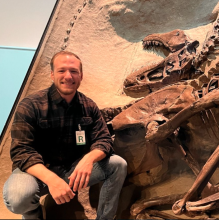
Paleontology and Geochemistry | Jackson School of Geosciences
Liam Norris has been fascinated since childhood by ancient life and the majestic creatures that once roamed the planet for millions of years. Now a fourth-year Ph.D. candidate in the Jackson School of Geosciences, Liam spends his time trying to learn more about how these prehistoric animals co-existed on Earth.
The goal of his current project is to explore whether different herbivores and carnivores at Dinosaur National Monument had different dietary preferences, and what that can tell us about their coexistence. He does this by using calcium isotopes in Jurassic dinosaur teeth to trace their role in the broader ecosystem.
As a native Houstonian, Liam had always heard about UT and even visited Austin multiple times growing up. He was drawn to its prime location in the heart of Austin but also its strong community of paleontologists.
Mercy Sosanya (she/her)
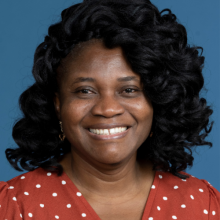
Nutritional Sciences | College of Natural Sciences
Before beginning her doctoral program in nutritional sciences at UT Austin, Mercy Sosanya (Ph.D., ’24) spent nearly a decade of her life exploring the issue of nutrition in her home country of Nigeria. In 2016, Sosanya had the opportunity to visit a rural village in the northern Nigeria, where she saw firsthand the devastating effects poor diets had on that community. She observed children with protruding ribs, swollen stomachs, wasted limbs and sparse hair – all recognizable signs of severe undernutrition.
This experience inspired Sosanya to better understand the root causes of this problem and develop interventions in collaboration with colleagues in northern Nigeria. With the help of the Harrington Dissertation Fellowship, she developed a body of research during her doctoral studies aimed at addressing this complex problem.
Erin Kelleher (she/her)
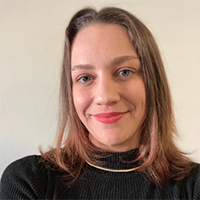
Middle Eastern Studies | College of Liberal Arts
As a freshman in college, Erin Kelleher remembers watching the Arab Spring unfold across much of the Middle East and North Africa. Curious to learn more about the region, she signed up for her first Arabic course. Erin is now pursuing a Ph.D. in the Department of Middle Eastern Studies in the College of Liberal Arts. Her research focuses on the cultural and social history of late nineteenth- and early twentieth-century Egypt.
“I chose to study at UT because of my department’s emphasis on a regional understanding of the Middle East. Because I am interested in intersections of Ottoman and Arab histories, and the places where these histories are intertwined, this aspect of the department’s approach to the region really resonated with me.”
Christos Kalli (he/him)
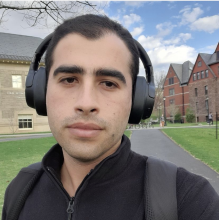
English | College of Liberal Arts
Christos Kalli uses poetry to map U.S. counterhistory of the epic form from the 1960s to the present. Christos focuses on how ethnic American writers creatively revised the social, political and cultural revolutions of the newly multicultural nation at the time. His research offers a comparative and theoretically innovative analysis of the epics by contemporary American poets.
Collectively motivated by questions of social justice and belonging, the poets that Christos studies revised a literary form to renegotiate national values, oppose historically contingent inequalities and devise alternative forms of community. Christos’s valuable and unique research helps to carve out a central place for ethnic writers in the development of the epic form.
Jonathan Hecht (he/him)
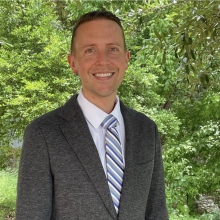
Philosophy | School of Nursing
Jonathan Hecht’s first-hand experience as a healthcare professional informs his research on the functionality of Rapid Response Teams in hospitals as a Nursing Ph.D. student at UT. His work explores the development of expertly trained nurses to support Rapid Response Teams as they combat patients’ clinical deterioration.
A two-time UT Austin alumnus, Jonathan appreciates the approachability of his accomplished professors. Professors’ willingness to break down complex concepts into easily understandable terms has been a throughline during Jonathan’s Bachelor’s, Master’s, and Ph.D. pursuits at UT.
Xinyue “Sally” You (she/her)

Information Studies | School of Information
Xinyue “Sally” You has always been interested in why people behave and interact the way they do, especially as it relates to immersive technology. Sally is in her second year as a Ph.D. student in the School of Information and spends her time exploring this complex human-technology relationship.
Her current study examines the psychology behind why people hesitate to try new experiences that initially seem uncomfortable, like when avatars walk through each other in virtual reality.
An international student from China, Sally was drawn to UT for many reasons, including Austin’s vibrant culture and her program’s cross-departmental, interdisciplinary approach to research.
Ayesha Mahmood (she/her)
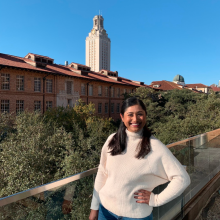
Microbiology | College of Natural Sciences
Ayesha Mahmood, a fourth-year Ph.D. candidate studying microbiology in the College of Natural Sciences, finds bacteria extremely captivating.
“Picture something so minuscule yet incredibly sophisticated - a microcosm akin to a bustling city with all its intricacies. Each bacterial cell is complex, and when you consider the interactions of bacteria with their environment, other microorganisms and how they cause illnesses in humans, the potential for comprehension seems boundless. We find ourselves constantly battling these microscopic entities, but we are losing. I want to make sure that doesn’t happen.”
The main goal of Ayesha’s research is to understand how antibiotic resistance-causing proteins produced by bacteria evolve, and to explore strategies to hamper this evolution, which, in 2019, contributed to 1.27 million deaths worldwide.
Prateek Mahajan (he/him)
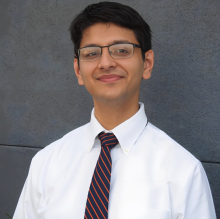
Finance | McCombs School of Business
Inspired by his work at a forensic finance consulting firm before grad school, Prateek Mahajan now studies finance as a fourth-year Ph.D. student in the McCombs School of Business. He is currently investigating finance-related challenges ranging from identifying fraud in government programs and inflated valuations in auto asset-backed securities to understanding the drivers of shrinking homeownership rates.
His first paper, co-authored with two UT finance professors, Drs. Griffin and Kruger, examined the Paycheck Protection Program (PPP), a COVID-era government stimulus program targeted at small businesses, for signs of fraud. Analyzing over a dozen different data sources, they were able to identify fraudulent activity in over 1.4 million loans representing more than $64 billion in taxpayer money.
Ryan A. Mata (he/him)
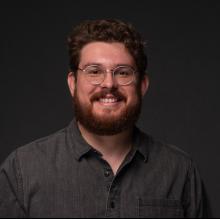
Human Development, Culture, and Learning Sciences | College of Education
Combining his interests in education and the psychology of learning, Ph.D. student Ryan A. Mata focuses on how facets of identity and culture play a role in educational trajectories and outcomes for adolescents and undergraduates. Ryan is a second-year Ph.D. student in the Human Development, Culture, and Learning Sciences program in the College of Education, and also a member of the Leadership Team and the Coordinator of Student Partnerships at the National Disability Center for Student Success.
Ryan pursues two lines of research - the first focuses on how institutions of higher education can provide inclusive learning environments so that disabled students can succeed academically. The second line focuses on how children develop beliefs about education through learning from parents, peers and their surrounding environment.
Nirmalay Barua (she/her)
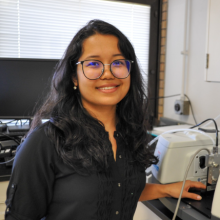
Materials Science and Engineering | Cockrell School of Engineering
Nirmalay Barua is a third-year Ph.D. student from Bangladesh studying gas sensing devices in the Materials Science and Engineering program. One of her current projects involves designing a smart mask for monitoring respiratory parameters in patients suffering from chronic obstructive pulmonary disease (COPD), a leading cause of death globally.
Nirmalay’s proposed solution to managing COPD is BreathIQ, an AI-driven device providing remote access to pulmonary rehabilitation. It allows COPD patients to perform exercises with interactive instructions and receive feedback wherever they are. UT has been integral to nurturing and advancing Nirmalay’s research interests by providing excellent facilities and a collaborative atmosphere for doing innovative work.
Isabelle Clark (she/her)
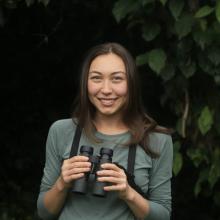
Biological Anthropology | College of Liberal Arts
Izzi Clark has always been fascinated by animal behavior and ecology. After studying wild lemurs in Madagascar as an undergrad, she became incredibly drawn to primates by their rich social lives and evolutionary proximity to humans.
Before coming to UT, Izzi was a research assistant for the Ngogo Chimpanzee Project, where she met her now-advisor and mentor, Dr. Aaron Sandel. Ngogo – once the largest group of chimpanzees ever studied – was splitting into two smaller groups, causing a hostile territorial conflict. Her deep interest in understanding the causes and consequences of this rare split brought her to UT where she is now a fifth-year Ph.D. candidate studying biological anthropology in the College of Liberal Arts.
Greg Holste (he/him)
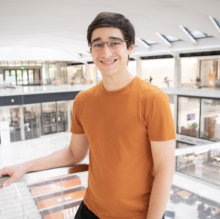
Electrical and Computer Engineering | Cockrell School of Engineering
Greg Holste has always been drawn to data analysis. Now a third-year Ph.D. student in the Department of Electrical and Computer Engineering, he is leveraging that skill to advance his research on medical artificial intelligence (AI). His most recent project focuses on detecting aortic stenosis (AS), a cardiac disease typically diagnosed using Doppler echocardiography.
Greg and his research team at UT, in collaboration with Dr. Rohan Khera at the Yale School of Medicine, developed an AI model capable of automatically detecting severe AS using 2D echocardiography without Doppler. He credits UT, specifically the VITA group, with helping him advance his research.
Ricardo Castro Agudelo
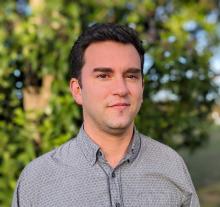
Latin American Literatures and Cultures | College of Liberal Arts
Ricardo Castro Agudelo is a fifth-year Ph.D. student studying Latin American literatures and cultures in the College of Liberal Arts. In his research, he explores representations of violence in Peru and in his home country of Colombia. He focuses on the multifaceted nature of memory-building in the aftermath of violent conflict, and the key role of empathy and narrative in this process.
“When you read or watch a representation, your brain's activity is engaged in a similar way as when you’re dealing with real-life scenarios. What we have uncovered is that this allows for eliciting empathy for others. It is something that storytellers throughout time have known intuitively. And it allows for better understanding in highly polarized societies, especially after internal conflict.”
Jackie Yang (he/him)
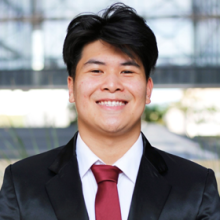
Counseling Psychology | College of Education
Jackie Yang is a first-year Ph.D. student studying counseling psychology in the College of Education. He was drawn to this field because of its holistic approach, incorporating mental health, social justice and advocacy elements. His research projects have covered a range of topics:
“In my first publication, we found that digital dating abuse, a form of intimate partner violence, is linked with external and internal stressors experienced by gay and bisexual men - the external stressor being discrimination and the internal stressor being internalized homophobia. I assisted on a second publication related to the demographic and behavioral factors associated with kratom usage, a traditional medicine in Thailand and Malaysia that produces a stimulant effect similar to opioids. The study demonstrated that White men and sexual minorities are at an increased risk for using kratom. These were very important findings for us.”
Weixin Guan (he/him)
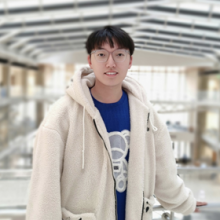
Materials Science and Engineering | Cockrell School of Engineering
Weixin Guan has always been interested in sustainability. As a chemical engineering major during his undergraduate years, he discovered the critical role materials innovation plays in pushing engineering practice to the next level. Now, as a second-year Ph.D. student studying materials science and engineering at the Texas Materials Institute at UT, he’s doing just that.
His current research is focused on solving the world’s growing water shortage problem. Two-thirds of the world’s population face some level of water scarcity, which has become especially critical in arid and inland areas. To address this, Weixin’s work is focused on atmospheric water harvesting - finding ways to extract and regenerate atmospheric water (also known as moisture) from the air we breathe.
Emily Bamber (she/her)
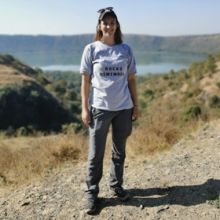
Geosciences | Jackson School of Geosciences
Emily Bamber, an international student from Wales, is a fourth-year Ph.D. student studying geosciences in the Jackson School of Geosciences. Her research, recently published in December, focuses on how impact craters on Earth and Mars have been altered by river activity.
“In my research, I focus on valleys that entered impact craters on Mars and Earth to help understand how water once flowed on the surface of Mars. When impact craters form, they form a circular pit on the surface that is surrounded by a crater rim, which can be thought of as mountains or hills around the circular depression. I’m interested in looking at the valleys that crossed the crater rim and figuring out how those rivers crossed what is basically a mountain belt. To answer this question, I’m using satellite imagery, computer modeling, and fieldwork at Lonar impact crater in India. Understanding the history of water will help us understand where to look for evidence of past life on the planet.”

